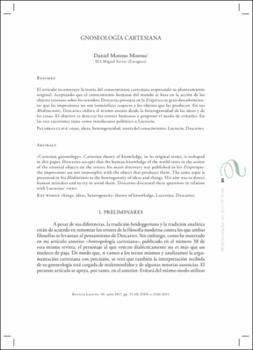Gnoseología cartesiana
Author
Moreno Moreno, DanielDate
2017Abstract
El artículo reconstruye la teoría del conocimiento cartesiana respetando su planteamiento
original. Aceptando que el conocimiento humano del mundo se basa en la acción de los
objetos externos sobre los sentidos, Descartes presenta en la Dióptrica su gran descubrimiento:
que las impresiones no son isomórficas respecto a los objetos que las producen. En sus
Meditaciones, Descartes enfoca el mismo asunto desde la heterogeneidad de las ideas y de
las cosas. El objetivo es detectar los errores humanos y proponer el modo de evitarlos. En
las tres cuestiones tiene como interlocutor polémico a Lucrecio. Cartesian theory of knowledge, in its original terms, is reshaped
in this paper. Descartes accepts that the human knowledge of the world roots in the action
of the external objects on the senses; his main discovery was published in his Dioptrique:
the impressions are not isomorphic with the object that produces them. The same topic is
presented in his Meditations as the heterogeneity of ideas and things. His aim was to detect
human mistakes and to try to avoid them. Descartes discussed these questions in relation
with Lucretius’ views.





